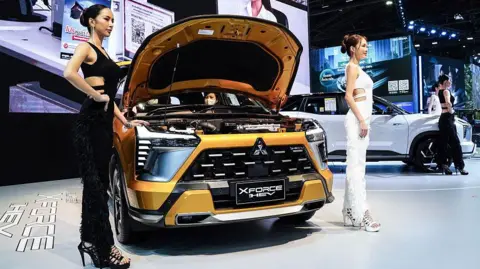In a significant development within the auto industry, Foxconn, the renowned manufacturer behind Apple’s iPhone, has officially announced ambitious plans to produce electric vehicles (EVs) for Mitsubishi Motors, a prominent player in the Japanese automotive sector. This announcement marks a crucial step for Foxconn as it seeks to penetrate the highly competitive EV market.
The preliminary agreement is set to initiate a joint venture between Foxconn and Mitsubishi, enabling them to design and construct vehicles in Taiwan. This collaboration signals Foxconn’s entry into EV manufacturing, a sector that has been witnessing exponential growth and stiff competition from various players, particularly those from mainland China. According to the statement released by both companies, they anticipate that the new model will be available by the close of next year, indicating a rapid progression towards actual production.
Mitsubishi Motors, along with other established Japanese car manufacturers, has recently faced increasing competition from their Chinese counterparts. These rivals have been aggressively expanding their market reach, particularly in key regions such as Southeast Asia, South America, and Europe. The competitive landscape is becoming ever more challenging, prompting Japanese automakers, including Mitsubishi, to seek new alliances and innovative solutions.
The vehicles produced under the Foxconn-Mitsubishi initiative will be manufactured by Foxtron, which is Foxconn’s automotive joint venture with Yulon Motor, a company based in Taiwan. This partnership is expected to leverage Foxconn’s extensive expertise in electronics manufacturing and Yulon Motor’s automotive knowledge, culminating in innovative EV offerings that cater to modern consumer needs.
As of now, the agreement between the two corporations exists in the form of a memorandum of understanding, representing a preliminary and non-binding commitment to collaborate. Both companies have indicated their intention to continue discussions to finalize a more concrete agreement. This preliminary stage is crucial as it sets the tone for potential future investments and strategic operational plans.
Foxconn, recognized globally as the largest contract electronics manufacturer, has been diversifying its portfolio beyond electronics. This move into the automotive sector is motivated by the company’s strategic vision of expanding its influence and operations in various industries. Previously, Foxconn had expressed interest in acquiring a stake in Nissan Motor, demonstrating its readiness to deepen its involvement in the automotive landscape.
Furthermore, within the broader context, Mitsubishi Motors serves as a junior partner in an alliance that includes Nissan and the French automotive giant Renault. The interconnectedness of these partnerships may present opportunities for enhanced collaboration and resource sharing, which are critical in the rapidly evolving automotive industry, especially as the demand for electric vehicles grows.
China’s automotive industry has experienced remarkable growth in recent years, establishing itself as a leader in the EV market. With major manufacturers like BYD gaining significant traction among consumers, traditional players are finding it increasingly difficult to maintain their market positions. The rapid evolution of the automotive sector necessitates a shift in strategy for companies like Mitsubishi as they navigate challenges posed by innovative market entrants and shifting consumer preferences.
In conclusion, the collaboration between Foxconn and Mitsubishi represents not only a pivotal moment for both companies but also underscores the broader transformation taking place in the automotive industry. As the world shifts towards electric mobility, the success of such partnerships will be critical in determining the competitive dynamics of the sector in the coming years. The rollout of new models as part of this joint venture will be closely watched, not only for their technological innovation but also for their strategic implications in a rapidly evolving global market.



